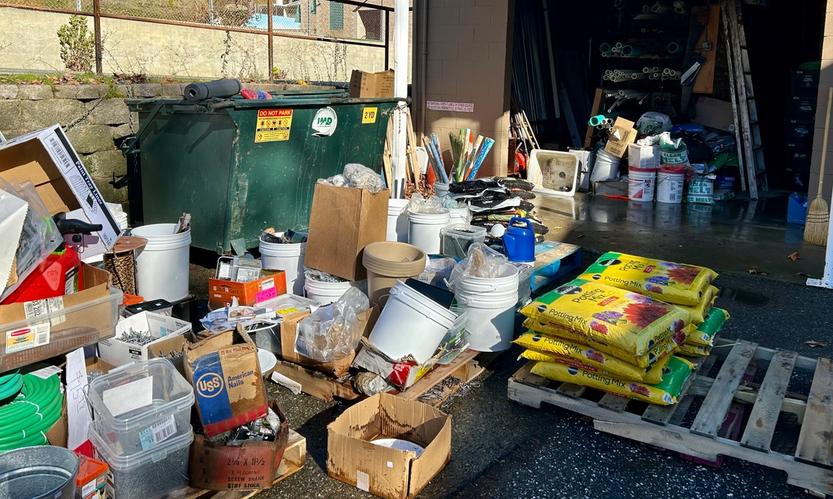Dr. K's Latest Endeavors
December 1, 2022
DOWNIEVILLE - Downieville is privileged to be one of the places Dr. Scott Kellermann calls home. Known to many locals as Dr. K, the doctor seen running up Lavezzola Road with a backpack to treat a mountain biker who was the victim to multiple rattlesnake bites, making a house call to deal with an infected spider bite, or sitting at the bedside of a dying relative to offer words of comfort, peace, and hope, he earned great respect for his service to the community. Running into Dr. K and local resident Paul Douville on their bikes on Nov. 17, I asked Dr. K about his latest adventures. His excitement over he and "Daredevil Douville" navigating the current icy and steep conditions of the North Yuba trail while cycling was almost equal to the recent completion of his soon to be published book, An African Gift. Yes, as it happens, Kellermann is also revered at his second home in the African nation of Uganda. In 2000, soon after arriving to visit the Batwan Pygmies of Uganda, Kellermann’s wife, Carol, expressed her concern about their plight. In 1991, the Batwa residing in the heart of Uganda’s Bwindi forest were kicked out of their ancient homelands when their land was designated as the Bwindi Impenetrable National Park. While mountain gorillas and other endangered species must be safe from poachers, the forest reclassification came with a heavy cost suffered by the Batwa. As displaced hunters and gatherers, holding unique customs and religious practices, previously tucked away from society, the Batwa not only lost their homeland, they were tossed onto rural streets and left without any assistance by the Ugandan government. With a life expectancy of only 25 years, earning less than $25 a year, and one out three children failing to celebrate their fifth birthday, diseases, including malaria and HIV/AIDs, began overwhelming the tiny, less than 4,000, population. In response to the situation they saw, the Kellermanns did what few would dare. They returned to Nevada County, ensured the sale of the Miners Clinic which Kellermann had helped establish and sold their home and possessions to help finance the creation of the Kellermann Foundation and a new home in Uganda in 2004. Over the course of the ensuing years, the Bwindi Community Hospital, beginning as a mobile medical clinic under a ficus tree, has grown into a 165-bed hospital, four being designated for intensive care in a country having only 48 ICU beds. Now, besides the Batwa, over a million people are served by the hospital and it is ranked as one of the top five hospitals in east Africa. The investment of supporters from around the world has also helped the Bwindi Community Hospital establish the only advanced-level nursing school in the region, the only dental chair for serving ¼ million people (another ten dental chairs are in the works), an ophthalmology unit to do eye surgeries (including cataracts), and to produce sustainable systems, they have also trained over 500 village health team members, "traditional healers in their culture," each one is responsible for 20-25 households, to be the hospital's eyes and feet in surrounding areas. To Kellermann, the same challenges exist in our little mountain town as in the mountains of the Bwindi forest. "How do you get healthcare to a remote community?" It requires supporters and boots on the ground to perform over 1500 surgeries annually, conduct more than 65,000 HIV tests a year, treat around 1,000 HIV patients, and provide health education to over 6,000 children who live in the region.” Donations to the Kellermann Foundation, many from people in Downieville, have helped reduce the high numbers of malaria patients and funding for health education, mosquito nets, better housing, running water, restrooms, and facilities have made a huge difference for the population, as well. However, Dr. K’s philosophy towards sizable charitable contribution checks is "buy an airline ticket and visit instead." What can one expect when visiting Kellermann's hospital? Be prepared to travel on unpaved roads ascending the terrain to their centers at 5,000 ft in the dense Bwindi rainforest. Bwindi translates to "impenetrable" in the local Runyakitara language. Whatever the mind can conjure up will not do justice to these misty forests with the melodies of over 300 species of birds and other diverse life flourishing. One has to take the risk of trying something new, getting their shots, purchasing a ticket, and traveling to the Bwindi Forest to experience a place fit for a National Geographic cover. Regardless of how long it takes, traveling by motorcycle or walking for miles through muddy and mucky roads, everyone is better off having the opportunity to trek up the mountains to get medical treatment. Here in Downieville, encountering a bear crossing the Durgan Bridge around noon or discovering one exploring a dumpster can happen. Likewise, the monkeys and gorillas in the Kanungu District are also out and about foraging through local residences, making the most of every opportunity. Don't be worried about accommodations if you visit. A guest house is available to host ambassadors, researchers, medical students, professors, and YOU. Communal dining with 15-20 other interesting persons from diverse backgrounds will provide delightful and stimulating conversations. In terms of exchanges, interestingly enough, the language of the Batwa forces one to live in the moment as their vocabulary offers little to no words dealing with the past or future tense. One artist visited and drew a map of the world in the back of the classroom; this is how the students discovered the world was round. This discovery for the Batwa was the catalyst for educators to start an adult education program. Subsequently, when many students return home from school, the parents leave fields and other work for the day and come to the classrooms to learn. No matter your background, there is something you can teach or offer should you be courageous enough to board the multiple planes necessary to reach the Bwindi community, but you will be changed and will not return the same. Sharing everything is what makes the community work. Joy, grief, and food, Dr. K says, "shared food is a lot tastier". The Batwa will want to know who you are, what you are about, and your motivations for visiting. Letters from folks who do visit and stay at their guesthouse remark, "I came over to change Africa, and Africa changed me." Visitors will wake from slumber to singing and dancing as music is "intrinsic in their culture." Besides sending his finished book An African Gift off to the publishers, other endeavors of Dr. K include teaching in person or on Zoom at universities in San Francisco, Elk Grove, and in "Yarlins." When I asked him to clarify the "Yarlins" he slowly spoke, "N-e-w- O-r-l-e-a-n-s." He admits it is pretty near impossible to teach surgery on ZOOM. Dr. K will be around Downieville until January, and then he will return to Uganda. Presently, he is working with the UC Davis veterinary school as a consultant with the EpiCenter for Emerging Infectious Disease Intelligence, established in 2020 as a part of the Centers for Research in Emerging Infectious Diseases (CREID) Network. The National Institute of Allergy and Infectious Diseases (NIAID) at the National Institutes of Health (NIH) funds this work. In a nutshell, Dr. K is partnering with UC Davis, focusing on viruses transmitted through mosquitoes, bats, and primates to humans. Six hours north of the Bwindi Forest, Dr. K has colleagues on the ground combating the Ebola-Sudan virus. Previously, the Kellermann Foundation helped administer vaccines for the Zaire-Ebola virus in their area and the Congo. Three experimental vaccines are being released in the upcoming days to combat the Ebola-Sudan virus. When Dr. K returns to Uganda in January, he will meet with a team and determine the next steps in battling Ebola. Those wishing to support Dr. K's commitment to the Batwa financially can visit . The adventurous souls wishing to visit Uganda can contact him directly at batwa3@gmail.com.
Featured Articles

Sierra Hardware Plans Extensive Repairs After Flood Damage →
December 8, 2025
Sierra Hardware faces extensive repairs after Thanksgiving flood damages store flooring and drywall.
Sheriff’s Office Accepts $60,000 Grant for New Search and Rescue Team →
December 2, 2025
Confusion Surrounds Release of the Plumas County Grand Jury’s Report →
December 4, 2025
WCB Considers Grant for Sierra Valley Tribal Land Purchase →
Updated November 22, 2025
Downieville Fire Auxiliary Hosts Annual “Holiday on Main” Event Saturday →
December 2, 2025
